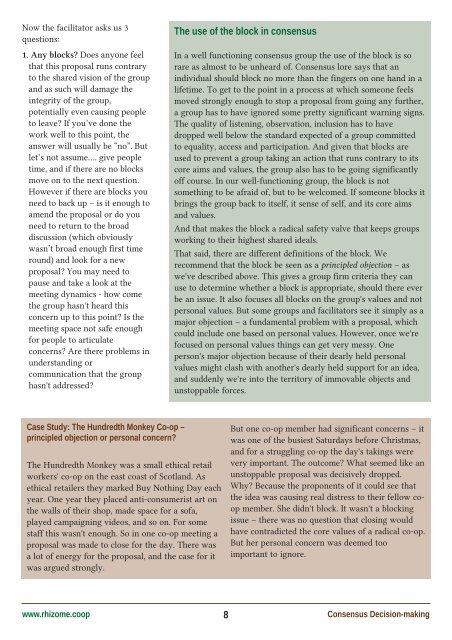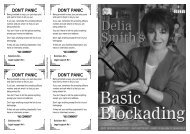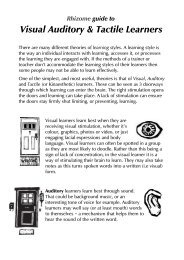Consensus Decision-making - Rhizome
Consensus Decision-making - Rhizome
Consensus Decision-making - Rhizome
You also want an ePaper? Increase the reach of your titles
YUMPU automatically turns print PDFs into web optimized ePapers that Google loves.
Now the facilitator asks us 3questions:1. Any blocks? Does anyone feelthat this proposal runs contraryto the shared vision of the groupand as such will damage theintegrity of the group,potentially even causing peopleto leave? If you’ve done thework well to this point, theanswer will usually be “no”. Butlet’s not assume…. give peopletime, and if there are no blocksmove on to the next question.However if there are blocks youneed to back up – is it enough toamend the proposal or do youneed to return to the broaddiscussion (which obviouslywasn’t broad enough first timeround) and look for a newproposal? You may need topause and take a look at themeeting dynamics - how comethe group hasn't heard thisconcern up to this point? Is themeeting space not safe enoughfor people to articulateconcerns? Are there problems inunderstanding orcommunication that the grouphasn't addressed?The use of the block in consensusIn a well functioning consensus group the use of the block is sorare as almost to be unheard of. <strong>Consensus</strong> lore says that anindividual should block no more than the fingers on one hand in alifetime. To get to the point in a process at which someone feelsmoved strongly enough to stop a proposal from going any further,a group has to have ignored some pretty significant warning signs.The quality of listening, observation, inclusion has to havedropped well below the standard expected of a group committedto equality, access and participation. And given that blocks areused to prevent a group taking an action that runs contrary to itscore aims and values, the group also has to be going significantlyoff course. In our well-functioning group, the block is notsomething to be afraid of, but to be welcomed. If someone blocks itbrings the group back to itself, it sense of self, and its core aimsand values.And that makes the block a radical safety valve that keeps groupsworking to their highest shared ideals.That said, there are different definitions of the block. Werecommend that the block be seen as a principled objection – aswe've described above. This gives a group firm criteria they canuse to determine whether a block is appropriate, should there everbe an issue. It also focuses all blocks on the group's values and notpersonal values. But some groups and facilitators see it simply as amajor objection – a fundamental problem with a proposal, whichcould include one based on personal values. However, once we'refocused on personal values things can get very messy. Oneperson's major objection because of their dearly held personalvalues might clash with another's dearly held support for an idea,and suddenly we're into the territory of immovable objects andunstoppable forces.Case Study: The Hundredth Monkey Co-op –principled objection or personal concern?The Hundredth Monkey was a small ethical retailworkers' co-op on the east coast of Scotland. Asethical retailers they marked Buy Nothing Day eachyear. One year they placed anti-consumerist art onthe walls of their shop, made space for a sofa,played campaigning videos, and so on. For somestaff this wasn't enough. So in one co-op meeting aproposal was made to close for the day. There wasa lot of energy for the proposal, and the case for itwas argued strongly.But one co-op member had significant concerns – itwas one of the busiest Saturdays before Christmas,and for a struggling co-op the day's takings werevery important. The outcome? What seemed like anunstoppable proposal was decisively dropped.Why? Because the proponents of it could see thatthe idea was causing real distress to their fellow coopmember. She didn't block. It wasn't a blockingissue – there was no question that closing wouldhave contradicted the core values of a radical co-op.But her personal concern was deemed tooimportant to ignore.www.rhizome.coop8 <strong>Consensus</strong> <strong>Decision</strong>-<strong>making</strong>





